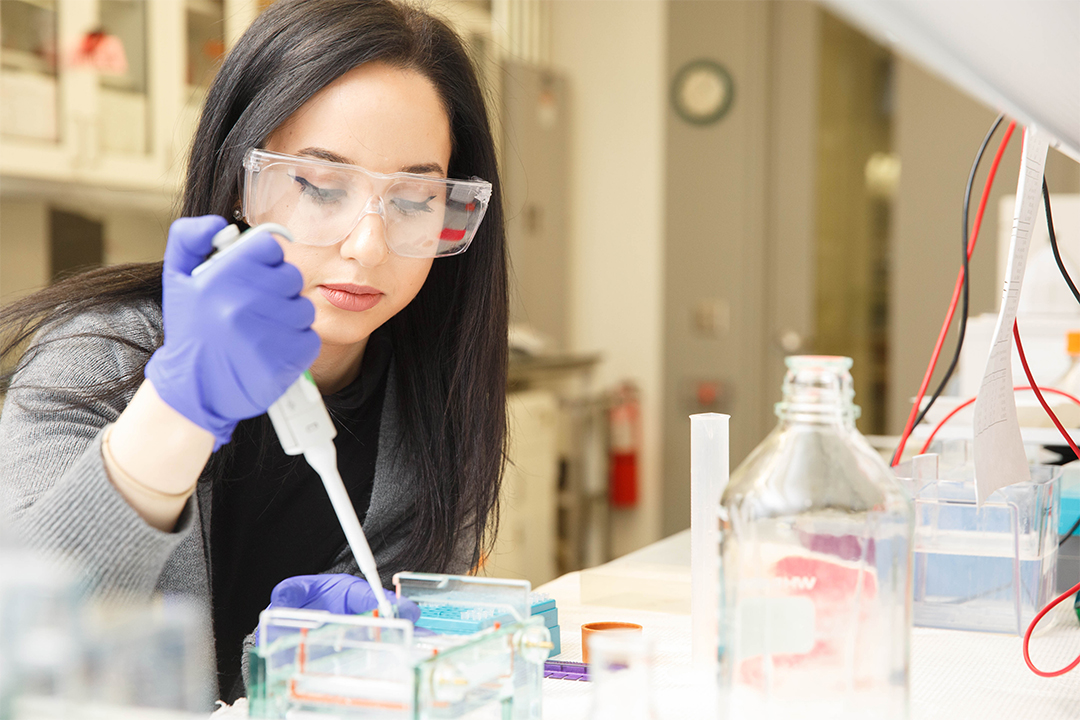Over the past academic year, Columbian College faculty received a significant number of grant awards to support a broad swath of innovative research across the disciplines. From examining fossil footprints in Africa to charting Gamma Ray bursts in the deepest reaches of space, scholars are forging new pathways of discovery. The following are among the college’s recent major grants:
Attiya Ahmad (anthropology): $181,000 from the National Science Foundation (NSF) to research Halal tourism in the Middle East.
Andrei Alexandru (physics): $298,000 from the U.S. Department of Energy (DOE) to examine nuclear physics calculations from quantum chromodynamics—the theory behind the strong interaction between quarks and gluons.
Lynne E. Bernstein (speech, language and hearing sciences): $312,000 from Facebook to enhance speech learnability by optimizing how vibrotactile—the perception of vibration through touch—interfaces with the brain’s speech systems.
Lisa Bowleg (psychology): $3,226,000 from the National Institutes of Health (NIH) /National Institutes on Drug Abuse for her research on reducing drug use among African American males and addressing related co-occurring negative mental and physical health issues; and $740,000 from the WK Kellogg Foundation to develop an innovative tool for accelerating progress in achieving racial equity in employment and maternal and child health.
Michael Bradley (economics): $122,000 from the U.S. Postal Service for research on product costing under the Postal Accountability and Enhancement Act.
David Braun (anthropology): $101,000 from NSF to examine hominin footprints, fossils and their context in the early Pleistocene of Koobi Fora, Kenya.
Christopher Brick (history): $195,000 from the National Archives and Records Administration to support work on the Eleanor Roosevelt Papers Project.
Christopher Cahill (chemistry): $373,000 from DOE for nuclear energy-related research on the fundamental chemical behavior of uranium, neptunium and plutonium under environmentally relevant conditions.
Ana Maria del Rio Gonzalez (Latino Health Research Center): $238,000 from NIH to study PrEP (HIV prevention medication) use among Latina immigrant transgender women in the D.C. area.
Susan E. Dudley (regulatory studies): $147,000 from the U.S. Department of Agriculture (USDA) to examine the impact of regulation on productivity.
Robert Entman (media and public affairs): $288,000 from Scripps Network Interactive Inc. for a project on TVN News’ practices assessment.
Gustavo Hormiga (biology): $422,000 from NSF to research the evolutionary biology of spiders.
Chryssa Kouveliotou (physics): $200,000 from NASA Goddard Space Flight Center to help develop a population census of young galactic X-ray sources; and $180,000 from NASA-Goddard for Magnetar observations with the Fermi/Gamma Ray Burst Monitor.
Ira Laurie (forensic sciences): $275,000 from the U.S. Department of Justice (DOJ) to investigate the use of gas chromatography with tandem ultra violet and mass spectrometric detection for the analysis of emerging drugs.
Stuart Licht (chemistry): $280,000 from DOE to develop an alkaline membrane-based ammonia electro-synthesis with high efficiency for renewable and scalable liquid-fuel production.
John Lill (biology): $141,000 from USDA for a program to protect the American chestnut through proactive taxonomy and phylogenetics of chestnut gall wasps.
Arnaud Martin (biology): $103,000 from NSF to examine the DNA model for butterfly wing pattern evolution.
Shannon McFarlin (anthropology): $398,000 from NSF to develop a comprehensive framework for deciphering hard tissue evidence of weaning variation in wild great apes.
Weiqun Peng (physics): $106,000 from NIH to examine how transcription factors (Tcf1/Lef1) and proteins (beta-catenin) operate within follicular helper T cells and maintain human immune systems.
Daniele Podini (forensic sciences): $493,000 from DOJ to access the forensic applications of genetic markers called microhaplotypes through massively parallel DNA-sequencing.
Scott Powell (biology): $288,000 from NSF to develop a new framework for explaining how ant colonies create well-functioning transportation systems via a process of gradual modification rather than design.
John Sides (political science): $191,000 from the New Venture Fund to increase research-based coverage of global health, hunger and poverty in The Washington Post Monkey Cage blog.
Adam Smith (biology): $351,000 from NSF to research the effects of social behavior on brain evolution in bees.
Malathi Thothathiri (speech, language and hearing sciences): $1,663,000 from NIH to research cognitive control and sentence processing among people with aphasia.
Akos Vertes (chemistry): $723,000 from NSF to examine high-resolution methods for studying soybean root biology and address the worldwide demand for food and fuel.
Huixia Wang (statistics): $125,000 from NSF to research a statistical modeling regression analysis involving high dimensional quantiles.
Note: Dollar figures are rounded to the nearest thousand.


